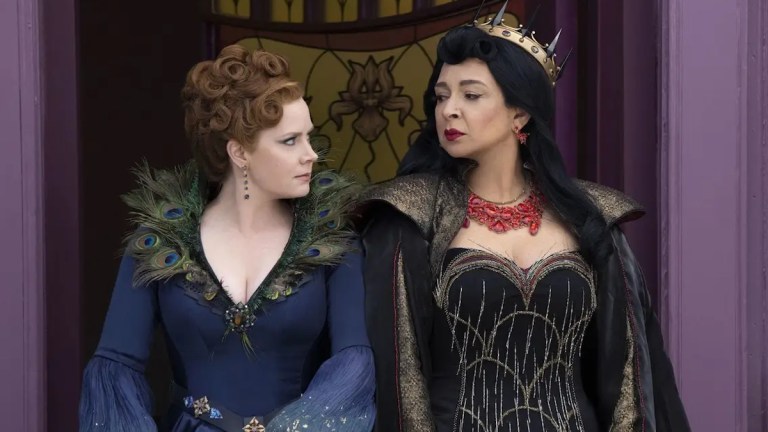Disenchanted Review: A Middle of the Road Middle-Aged Fairytale
Disney's belated sequel to Enchanted, Disenchanted, asks what comes after happily ever after? Like in life, the answer might disappoint you.

Disney’s sequel to 2007’s princess-out-of-water story, Enchanted, sees Princess Giselle (Amy Adams) and her newfound family dealing with monsters unlike any she had to face in her cartoon world of Andalasia: midlife crisis, teenagers, and mean mom cliques. Disenchanted may not cover new ground, but there’s nothing disingenuous about its commitment to enjoyable characters.
When Giselle was banished from Andalasia and sent to the “real” three-dimensional world of New York City, she found true love with single dad/lawyer Robert (Patrick Dempsey and his famously great hair) and his young daughter, Morgan. There, Adams glowed as the living embodiment of a Disney princess. Her poofy dresses, animal helpers, and penchant for bursting into song could’ve easily been grating on paper, but the star and her wide-eyed naiveté were irresistibly convincing. Watching a Disney princess make cockroaches and hardened New Yorkers dance was unselfconscious fun. And as a Disney princess/romantic comedy hybrid, the film’s story having Giselle and Robert fall in totally uncynical love was inevitable. The End.
Disenchanted picks up a little while after that, and after the birth of Robert and Giselle’s daughter Sofia. Sleep-deprived and crowded in their tiny-by-movie-standards apartment, the not-so-newlyweds are still deeply in love, but growing distant. Morgan, now adeptly played by newcomer Gabriella Baldacchino, is in high school and no longer quite so into fairytales. If your mom sang to her coffee every morning, you might get tired of them too. But Giselle still has her dogged determination to make every day magical, even if she’s becoming disillusioned with her city life. So like many fed up New Yorkers of a certain age and household income, the family heads for the suburbs.
Of course a fancy suburban development like Monroeville appears to be a picturesque solution to Giselle’s problems, but newborn babies still cry, old houses don’t fix themselves, and teenagers don’t always like their parents. And while Monroeville reminds Giselle of her old magical kingdom, she still doesn’t fit in, particularly with the supermom clique led by self-proclaimed queen bee, Malvina Monroe (Maya Rudolph). Rudolph livens up the movie with her presence, leaning into this wicked witch of a judgy neighbor in a way Susan Sarandon’s actual wicked witch in the original movie could never.
Malvina and Monroeville’s other denizens are exaggerated, but also pretty believable as caricatures of what every city slicker fears becoming once they leave their urban homes. Robert in particular is feeling directionless, past his prime, and in a particularly funny scene, his morning train commute fills him with totally relatable existential dread. Morgan hates her small town and feels less magical than her little half-sister, causing a divide between Morgan and Giselle that’s magnified when Giselle and Robert’s exes, now the King Edward (Westworld’s James Marsden) and Queen Nancy (Idina Menzel) of Andalasia, show up for a visit with a rare gift for their baby goddaughter. Naturally, fantasy intrudes on reality in the form of a wish gone wrong—and Monroeville turning into a literal fairytale world.
As a consequence every character pays a price: Morgan becomes a self-sacrificing, chore-doing stepdaughter like Cinderella, Robert seeks out dragons to slay with his new sword, and Malvina is full-on gothed out in fierce black gowns and evil schemes (although you can’t help but feel Malvina was scarier as a real estate agent). Even Giselle finds herself changed: she’s now the wicked stepmother. (It’s also an excuse to include plenty of easter eggs including a really cute blink-and-you’ll-miss-it nod to The Little Mermaid).
Yet the change is not perhaps as magical as the concept suggests. Dempsey’s Robert and his sudden desire to become a storybook prince diminishes his part as a pragmatic foil to Giselle’s whimsy, and the character’s unfortunately not as in on the joke as James Marsden, whose dopey, naive King Edward steals every scene he’s in. Thankfully, Edward’s charm hasn’t changed much at all.
The animation does seem more polished this time around and the visuals are full of sparkles and candy colors. Sadly, the songs are not the most memorable parts of this Disney movie. While it’s great that Tony Award-winning Broadway star Idina Menzel (Frozen) actually sings in her role as Queen Nancy this go-round, it’s an embarrassingly bombastic song called “Love Power,” which is about, well, love power. At least there’s no danger of this song becoming an earworm anthem like “Let It Go.”
The songs also add to the inflated length, but that’s about all they add. When it’s clear where the movie will be heading—as it is from the first scene, really–the movie can’t justify its length, no matter how pretty the sets and Amy Adams’ gowns are.
Much like its predecessor, Disenchanted doesn’t have a lot of room for irony or self-reflection, even as it lets Adams escape the confines of Giselle’s inherent goodness for a brief stint as a wicked stepmother. The transformation is quite literal, and while Giselle may question why some women in fairytales are destined to be villains, particularly once they age out of the young, unmarried princess stage, it’s jazz-handed away in a big, showy duet with Malvina and never brought up again.
Disney’s never done much postmodern navel-gazing, and that’s fine for a kids’ movie, but it feels like a missed opportunity to make Disenchanted more enjoyable for the adults who have learned that if you stick around long enough after the “ever after” in a story, you’ll eventually find unhappiness, whether it’s divorce, illness, or, ultimately, death. Disenchanted aims to lessen that sting with a song and dance routine dressed up in nostalgia, but never fully recognizes that while Andalasia doesn’t change, audiences’ sensibilities do. Not exciting enough for young kids, nor clever enough for grown-up romantics, Disenchanted may focus on middle age, but seems stuck in that awkward phase somewhere in between.
Disenchanted is streaming now.
